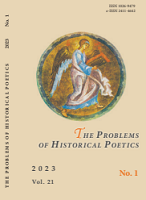Манипулятивные стратегии Петра Верховенского в романе Ф. М. Достоевского "Бесы"
Manipulative Strategies Used by Pyotr Verkhovensky in F. M. Dostoevsky’s Novel “Demons”
Author(s): Valentina Nikolayevna StepchenkovaSubject(s): Politics, Psychology, Studies of Literature, Ethics / Practical Philosophy, Aesthetics, Russian Literature
Published by: Петрозаводский государственный университет
Keywords: psychologism; psychological techniques; manipulation; manipulative strategy; revolutionary ideas; ethics; politics; aesthetics; poetics; Machiavellianism; nihilism;
Summary/Abstract: The novel “Demons” presents a polyphony of the characters’ opinions, however, the revolutionary idea of Peter Verkhovensky, whose anti-Christian essence is revealed by Dostoevsky, is aggressively dominant. Revolutionary Machiavellianism finds its expression in the plot of the novel, which moves due to the active efforts of Pyotr Stepanovich, and the exposure of the hero’s demonic idea sets its anti-nihilistic genre vector. The narrative strategies of the novel are defined both through Verkhovensky’s ultimate goal - the “shock” and “decomposition” of the society’s spiritual and moral foundations to lead it to a revolution — and through the presentation of the hero’s communicative tactics on the way to this goal. Pyotr Verkhovensky uses the well-known “recipes” of the political “kitchen:” he agitates, propagandizes, intrigues, incites, tempts with future blessings, etc. The main mechanism of these acts is the psychological impact phenomenon. Precisely in view of this phenomenon it is explained how “the purest heart and the simplest people” can be turned into “demons.” Verkhovensky skillfully guesses the others’ mental structure and moral demands, studies the “living science of people,” as a result of which he develops a whole system of verbal and non-verbal methods of psychological influence, which allows him to influence people of different social status, characters and aspirations. The use of psychological influence methods can be observed in his dialogues and targeted monologues, non-verbal methods of psychological influence are expressed through gestures, looks, tone of voice, body position, gait, etc. Various methods of psychological influence of Pyotr Verkhovensky are correlated with a number of motifs with a negative connotation: flattery, hypocrisy, fear, threat, denunciation. There is a connection between the artistic embodiment of the principles of Pyotr Verkhovensky’s revolutionary tactics and the provisions of the revolutionary S. G. Nechaev, which were set forth in the Catechism of a Revolutionary (1869) that lent Dostoevsky his character’s ethical attitudes, the intention to commit a crime and the generally demonic spirit of the theses he presents. Consideration of the means of psychological influence through the analysis of the speech and behavior of Pyotr Verkhovensky not only allows to correlate his thoughts with the ideological basis of this historical document, but also helps in a holistic understanding of Dostoevsky’s novel.
Journal: Проблемы исторической поэтики
- Issue Year: 21/2023
- Issue No: 1
- Page Range: 91-113
- Page Count: 23
- Language: Russian

